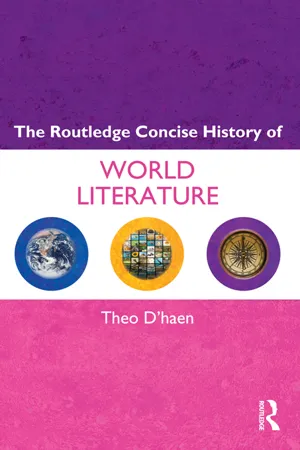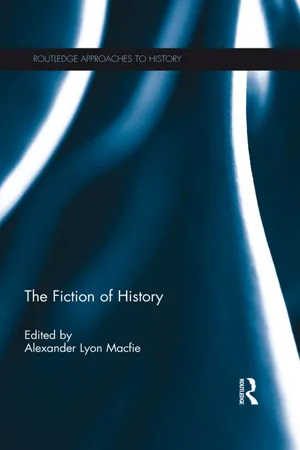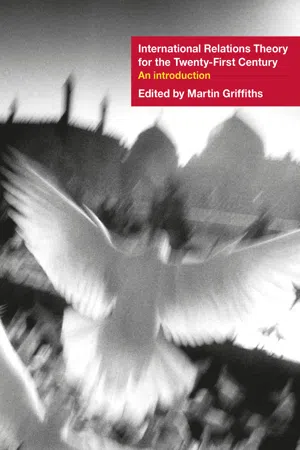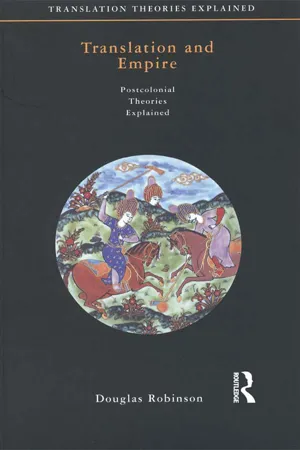Postcolonial Literature
Postcolonial literature refers to literary works produced in countries that were once colonized by European powers. It often explores themes of identity, cultural hybridity, and the impact of colonialism on society. Postcolonial literature seeks to challenge and subvert colonial narratives, offering diverse perspectives and voices from the formerly colonized regions.
8 Key excerpts on "Postcolonial Literature"
- eBook - ePub
Postcolonial Theory
A critical introduction
- Leela Gandhi(Author)
- 2020(Publication Date)
- Routledge(Publisher)
...8 Postcolonial Literatures The contesting themes of nationalism and postnationalism which we have been discussing govern the critical concerns of postcolonial literary theory. It is to this specialised branch of postcolonialism that we will now direct our attention. Despite its interdisciplinary concerns, the field of postcolonial studies is marked by a preponderant focus upon ‘Postcolonial Literature’—a contentious category which refers, somewhat arbitrarily, to ‘literatures in English’, namely, to those literatures which have accompanied the projection and decline of British imperialism. This academic privileging of Postcolonial Literature is informed by recent critical attempts to postulate the colonial encounter primarily as a textual contest, or a bibliographic battle, between oppressive and subversive books. Following the impact in the mid-1980s of ‘ cultural materialism’ upon literary theory, critical practice has been urged to concede the material underpinnings of all culture. Texts, as is now commonly agreed, are implicated in their economic and political contexts. Few critics would dispute the understanding that all literature is symptomatic of, and responsive to, historical conditions of repression and recuperation. While postcolonial literary theory invokes these cultural materialist assumptions in its account of textual production under colonial and postcolonial conditions, it goes a step further in its claim that textuality is endemic to the colonial encounter. Texts, more than any other social and political product, it is argued, are the most significant instigators and purveyors of colonial power and its double, postcolonial resistance. Thus, as Chris Tiffin and Alan Lawson insist: ‘Imperial relations may have been established initially by guns, guile and disease, but they were maintained in their interpellative phase largely by textuality’ (Lawson & Tiffin 1994, p. 3)...
- Theo D'haen(Author)
- 2013(Publication Date)
- Routledge(Publisher)
...7 World Literature, (Post)Modernism, (Post)Colonialism, Littérature-Monde Overview In the early 1990s the well-known postcolonial critic Homi Bhabha proposed that Postcolonial Literature might be the new world literature. For him the literature of the displaced, the exiled, the uprooted, the marginalized, more accurately reflected the state of the present-day world than the postmodern literature produced by so-called mainstream literatures in the West. In reality, the division between postcolonialism and postmodernism is not so clear-cut. In fact, many contemporary writers may be seen to fit both categories. Moreover, most of the writers that would fit Bhabha’s postcolonial category write in the language of the former colonizer or the present-day hegemon.This raises the question whether the postcolonial as commonly conceived of in present-day literary studies, rather than an alternative to “Western” literature, is not simply one more projection of that same Western hegemony in matters literary, theoretical as well as practical. If such issues have increasingly come to the fore in Anglophone literary criticism, they have been much less debated in other languages. Very recently, though, the issue has erupted also in French-language literature with a much-noted manifesto in a leading Parisian daily, followed by a collective volume. Postcolonial Literature as World Literature In his introduction to Locations of Culture (1994) Bhabha cites Goethe’s remarks in the latter’s introduction to Thomas Carlyle’s Life of Schiller (1830) that through the Napoleonic Wars nations had become aware of “much that was foreign” and conscious of “spiritual needs hitherto unknown” (Strich 1949: 351; Bhabha cites another, older translation, viz. that by Joel Spingarn [1921], which gives the same passages as “many foreign ideas and ways” and “previously unrecognized spiritual and intellectual needs,” Bhabha 1994: 11)...
- eBook - ePub
- Alexander Lyon Macfie(Author)
- 2014(Publication Date)
- Routledge(Publisher)
...Part IV Postcolonial studies 10 Rewriting Algeria, past and present History and cultural politics in two novels by Tahar Djaout Jane Hiddleston DOI: 10.4324/9781315773544-11 If ‘postcolonialism’ refers ostensibly to reflection on the historical period of European colonialism and its aftermath, it is nevertheless striking that it is a term that has gained particular currency in literature departments in Europe and the US. And while ‘postcolonial studies’ is above all concerned with the history and consequences of the colonial project, literary writers have played a very prominent role in probing and challenging the colonial past and its legacy from new perspectives. Nevertheless, the somewhat uncertain role and status of creative literature in responding to both colonial history and contemporary postcolonial politics has generated extensive debate amongst postcolonial critics, who seek to articulate how literature offers a singular approach to historical analysis in its use of the imagination and in its experimental, non-argumentative form and language. Ato Quayson has described how, given that the social world is itself a world of flux, similarly multifaceted and imaginative literary works are able to engage with that dynamism on a distinct but parallel level, and Nick Nesbitt has highlighted the tight relationship between political questioning and literary innovation, particularly as it is dramatised by Aimé Césaire. Conversely, Nicholas Harrison has noted the ways in which literary aesthetics necessarily both participates in and exceeds the domain of historical and political reflection, since literature always maintains a ‘suspended’ relationship with its referent and retains on some level a degree of autonomy...
- eBook - ePub
Using Critical Theory
How to Read and Write About Literature
- Lois Tyson(Author)
- 2020(Publication Date)
- Routledge(Publisher)
...Finally, many postcolonial theorists believe that postcolonial populations also include non-white peoples who have minority status in Britain, Europe, and the United States—for example, in the US, African Americans, Latinx 1 Americans, and Asian Americans—because, like colonized populations, these peoples have been deprived of much or all of the culture, language, and status they enjoyed in their homelands or have experienced the loss of cultural traditions due to powerful socioeconomic pressures to conform to the dominant culture. Postcolonial concepts can also help us explore the ways in which multiple forms of oppression—for example, classism, sexism, heterosexism, cissexism, 2 and racism—can combine in the daily experience of members of political minorities; the ways in which members of these groups have overcome these kinds of oppressive forces and worked together to build better lives for themselves and their communities; and the ways in which such struggles are represented in literature. Postcolonial concepts will thus enable you to combine and expand what you’ve learned from the critical theories you’ve used in preceding chapters. Don’t be surprised, then, if you notice that some of the postcolonial interpretation exercises we do later overlap with some of our interpretation exercises from previous chapters. Although postcolonial concepts will often help us see a literary work from a perspective quite different from the perspectives offered by the other theories we’ve studied, postcolonial concepts will sometimes combine the insights offered by other theories in an effort to show us, for example, all of the cultural factors influencing characters’ behavior or plot events. The term Postcolonial Literature refers to literary works written both by members of colonized or formerly colonized populations and by members of the colonizing (white) culture in colonized or formerly colonized nations...
- eBook - ePub
The Empire Writes Back
Theory and Practice in Post-Colonial Literatures
- Bill Ashcroft, Gareth Griffiths, Helen Tiffin(Authors)
- 2003(Publication Date)
- Routledge(Publisher)
...There is also a sense in which post-colonial writing itself, as well as the systematic indigenous theories, offers a broader, non-Eurocentric perspective on some traditional questions of theory. What kinds of writing ‘fit’ or could be considered to fit into the category ‘literature’; how do texts ‘mean’; by what criteria could or should these texts be evaluated; how do they dismantle the process of ascribing ‘merit’ through critical practice; and how applicable are the universalist assertions of European theory to the growing body of post-European literatures. This perspective does not necessarily exclude conclusions which may be reached within Eurocentric theory, but its very existence questions the circumscribed range of that theory's project. ‘Literature' The interaction of english writing with the older traditions of orature or literature in post-colonial societies, and the emergence of a writing which has as a major aim the assertion of social and cultural difference, have radically questioned easy assumptions about the characteristics of the genres we usually employ as structuring and categorizing definitives (novel, lyric, epic, play, etc.). Our sense, not only of that which ought to enter the canon, but also of what could be given the name ‘literature’, has been altered by writers incorporating and adapting traditional forms of imaginative expression to the exigencies of an inherited english language. For example, African literatures, as a result of their interface with traditional oral narratives, have offered a number of alter/native ways of conceiving narrative structure. These have influenced both the structure and features of ‘novels’ produced in english in that continent (Fritschi, 1983), 6 and insisted on the inclusion of many forms of performance art in any effective cross-cultural discussion of the structure and form of narrative...
- eBook - ePub
Beginning postcolonialism
Second edition
- John McLeod(Author)
- 2013(Publication Date)
- Manchester University Press(Publisher)
...In contrast to liberal humanist readings by critics of Commonwealth literature, the (newly named) ‘Postcolonial Literatures’ were at a stroke regarded as politically radical and locally situated, rather than universally relevant. They were deemed to pose direct challenges to the colonial centre from the colonised margins, negotiating new ways of seeing that both contested the dominant mode and gave voice and expression to colonised and once-colonised peoples. Postcolonial Literatures were deemed actively engaged in the act of decolonising the mind, worldly rather than abstract, local and political rather than general and liberal. This approach was crystallised in an important book that appeared at the end of the 1980s titled The Empire Writes Back: Theory and Practice in Post-Colonial Literatures (Routledge, 1989), co-authored by three critics who were based in Australia: Bill Ashcroft, Gareth Griffiths and Helen Tiffin (a second edition appeared in 2002). Inspired by Rushdie’s argument about the need to decolonise the English language, The Empire Writes Back orchestrated the issues we have been exploring into a coherent critical practice. It epitomised the increasingly popular view that literature from the once-colonised countries was fundamentally concerned with challenging the language of colonial power, unlearning its world-view, and producing new modes of representation. Its authors looked at the fortunes of the English language in countries with a history of colonialism, noting how writers were expressing their own sense of identity by refashioning English in order to enable it to accommodate their experiences. English was being displaced by ‘different linguistic communities in the post-colonial world’ (p. 8) who were remaking it as an attempt to challenge the colonial value-system it enshrined, and to bear witness to these communities’ sense of cultural difference...
- eBook - ePub
International Relations Theory for the Twenty-First Century
An Introduction
- Martin Griffiths, Martin Griffiths(Authors)
- 2007(Publication Date)
- Routledge(Publisher)
...But to reduce or subsume postcolonial theory within any of these approaches, however broadly defined, does not do justice to its originality, heterogeneity, and multiple sources of inspiration. To be sure, thinkers commonly associated with poststructuralism and postmodernism such as Michel Foucault, Jacques Derrida, and Jacques Lacan figure prominently in the pantheon of postcolonialism, but their ideas are frequently applied in novel and eclectic ways. Many postcolonial writers would also argue that their explicit political commitment to the subaltern or the marginalized distinguishes their accounts from what are frequently regarded (rightly or wrongly) as the more relativistic analyses of the other ‘post-isms’ (Appiah 1997; Paolini 1999; Young 2001). In this respect, postcolonialism is in close dialogue with the Marxist tradition of criticism, as evidenced for example in the widespread use of the Gramscian term ‘subaltern’. Again, eclecticism characterizes the use of Marxist-inspired methodologies and theories, combining its traditional materialism with detailed attention to the subjective effects and micro-politics of oppression. Another dialogue is between postcolonial and feminist analyses, both sharing a commitment to ending gendered oppression. As with Marxism, the relationship is ambiguous. While recognizing the oppression of women everywhere, postcolonial writers have pointed to the risk of producing a singular, monolithic ‘Third World Woman’, where Western women are cast as the normative (liberated) referent and the ‘Third World Woman’ their binary opposite as poor, victimized, domesticated, and traditional (Mohanty 1993)...
- eBook - ePub
- Douglas Robinson(Author)
- 2014(Publication Date)
- Routledge(Publisher)
...It will enable them to place specific historical events in a larger geopolitical context. (3) ‘Power-relations’ studies. This approach will prove fruitful for cultural theorists who are most interested in foregrounding power relations that until recently have been repressed, idealized or universalized. It will enable them to draw on the full range of human history for examples of human domination and its costs, thus effectively blocking the dismissive conservative response that such-and-such ‘postcolonial’ phenomenon isn’t true of us, or of the cultures we value. It is possible to go further still: “Some contemporary critics”, write Ashcroft, Griffiths and Tiffin in The Empire Writes Back, “have suggested that post-colonialism is more than a body of texts produced within post-colonial societies, and that it is best conceived of as a reading practice” (1989:193). This stricture could apply equally well to all three definitions of the postcolonial. In ‘post-independence’ studies, postcolonialism is one way of looking at the history of Europe’s former colonies after independence – an enormously productive and seemingly obvious and inescapable way, but certainly not the only way. In ‘post-European colonization’ studies, postcolonialism is one way of looking at the history of Europe and its sphere of political and cultural influence over the past four or five centuries – a tendentious way, for some people, since it tends to cast a rather unpleasant light on certain European texts, leaders, events and self-conceptions that until very recently have been idealized, but again, just one way...







